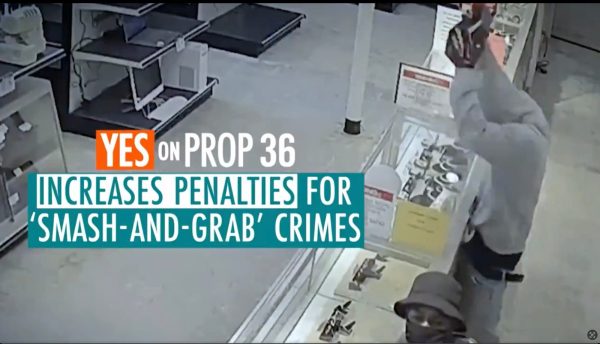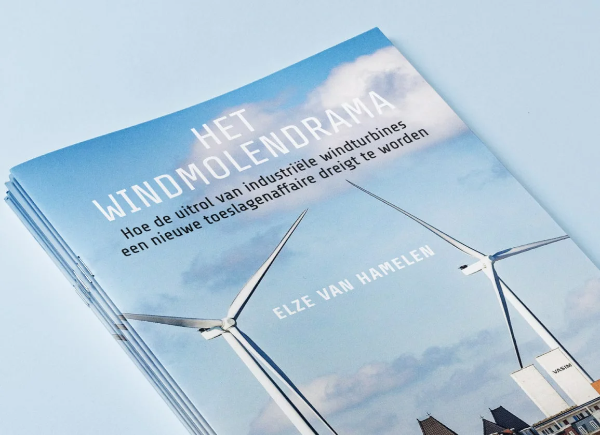NOVEMBER–MONTHLY MIXER

STURGIS MOTORCYCLE MUSEUM // 999 MAIN ST // 5-7PM // NOV 14
Join us this Thursday, November 14th!
Make plans to stop by the Sturgis Motorcycle Museum & Hall of Fame on Thursday, November 14th from 5 to 7pm for an evening of great conversation and a look at one of our world-famous Sturgis museums.
What better way to kick off the holidays than by showing your support for a local business! Invite a friend or two and meet the business community of Sturgis.


Why California Took So Long To Crack Down On Crime
Years of lawlessness may, finally, come to an end — no thanks to Gavin Newsom and Kamala Harris
By Michael Shellenberger
Thank you to Bari Weiss and the Free Press team for commissioning and editing this piece!
And thank you to all of you who subscribed recently and sent kind notes about your reactions to the recent elections. Many of you said you have started to have hard conversations with friends and family, including those who lost their minds over the last few years. I’m so glad to hear it. — MS
Over the last quarter century, progressives argued that we should decriminalize drugs, stop enforcing laws against nonviolent crimes, and radically reduce the number of people in prison. This softer approach to crime, addiction, and homelessness was demonstrably more effective and compassionate than tougher models, they said. Hundreds of articles, books, documentaries, TV segments, and fact sheets all buttressed this worldview.
We all needed more empathy for those committing crimes, more empathy for drug dealers, the activists said, and soon the politicians did, too. In that frenzy of compassion, it wasn’t the criminals who were demonized, but the victims.
Blue states across the country—especially California, Oregon, and Washington—spent the past decade as real-world laboratories of these radical theories. The result has been one of the worst humanitarian disasters in American history. And nowhere was it worse than my state: California, where soft policies were implemented first and most forcefully.
Historians who go looking for the beginning of the story might look at Proposition 47, passed 10 years ago by California’s voters. This law put into practice one of those “compassionate” ideas: it transformed any theft of goods worth less than $950 from a felony into a misdemeanor. It did the same with drug possession.
As a result, prosecutors lost much of the legal authority they needed to prosecute, for example, breaking and entering, resulting in brazen smash and grabs orchestrated by criminal gangs, and leaving store employees and customers helpless as they watched criminals loot everything from luxury items to toiletries. It also became much more difficult to prosecute drug dealers, who could simply say that their drugs were for their own use. Drug dealers also took advantage of Prop 47 by parceling out their supply to homeless addicts, who would then take the fall if they were caught.
The number of homeless people in California—destitute primarily as a result of addiction and mental illness—rose by over 50 percent over the last 10 years, from 113,952 in 2014 to 181,399 in 2023.
Violent crime rose, too. As of 2022, it was 31 percent higher in California than the national rate. “This divergence is driven largely by aggravated assaults, which have been declining nationwide while rising in California,” noted the Public Policy Institute of California last November. One out of four San Francisco residents polled say they were a victim of crime in the last year; 42 percent say they were a victim more than once.
Meanwhile, the downtown areas of cities like Los Angeles and San Francisco became uninhabitable thanks to the rise of open drug use and petty crime. (If you wonder why toothpaste and deodorant are under lock and key in drug stores, this is why.) So many businesses fled San Francisco’s city limits that the vacancy rate for commercial real estate hit an astonishing 36 percent by the end of 2023.
Such lawlessness has unfortunately hardened the hearts of many, which only compounds the tragedy. I have spent the past five years bearing witness to the lives—and the deaths—of the people suffering under these policies. A few scenes will suffice to capture their destitution and misery.
This August, on Skid Row, a few blocks from downtown L.A., I discovered a Venezuelan mother who lived in a tent on the street, holding a 2-year-old with a large scar visible on his chest. The mother told me, in Spanish, that he is autistic. A boy of about 8 was also living in their tent. He lurked behind them, appearing frightened while a tough-looking friend or relative stared at us menacingly.
This was only one tent among thousands—people living in a major American city in conditions more violent, squalid, and inhumane than I have seen in the slums of New Delhi or Rio de Janeiro. People overdose on fentanyl and then are revived 10 or 20 times with Narcan before they die. Women, often psychotic and with open wounds, are raped in tents. People lie, literally, in the gutters, as the more fortunate walk by.
Oakland, California, meantime, brought chaos and crime directly into the neighborhoods of even wealthy residents. Long a hothouse of radicalism, no other city has more aggressively defunded and demoralized the police than Oakland. The upshot is a city that is something closer to lawless than law-abiding. The wait time by Oakland residents for a response to their urgent (“priority 1”) 911 calls rose from 23 minutes to roughly 50 minutes, on average, between 2022 and 2023. This was by design. The idea has been that we can slowly transition away from needing police at all.
Last year in San Francisco, drug dealers sold drugs that killed 810 people. The dealers, most of whom are from Honduras, are in the U.S. illegally but are protected by the city’s “sanctuary law,” which was created in 1989 to protect refugees fleeing war and violence and today is mostly used to protect the dealers and the multibillion-dollar transnational mafias for which they work.
The city’s former district attorney—he was recalled in 2022 at the start of the wave we saw crashing this week—said that the drug dealers are victims too. “A significant percentage of people selling drugs in San Francisco—perhaps as many as half—are here from Honduras,” Chesa Boudin said. “We need to be mindful about the impact our interventions have,” he said. “Some of these young men have been trafficked here under pain of death.” But no one ever seemed to spare a thought for the people dying of those drugs, or the kids who had to see people dying in the streets on their way to school.
Businesses cannot function in this kind of environment. Nordstrom, Whole Foods, Target, Denny’s, and Starbucks all closed stores over the last two years in San Francisco and Oakland, citing crime, the destruction of downtowns, and the need to protect “team members and guest safety.”
Just between 2020 and 2022, a quarter of a million people fled the Bay Area, having come to the conclusion that things might not ever get better.
But finally, on Tuesday, California voters decided to trust their own eyes. They rejected the experts and the media who told them this was what compassion looked like—and voted for a return to normalcy and safety.
Just look at the results:
Proposition 36, a statewide measure to undo Prop 47, passed by 70 percent. The new law turns some misdemeanors into felonies (for example, shoplifting if it is a third offense), lengthens some felony sentences (i.e. smash-and-grab thefts involving three or more people), and requires some felonies to be served in prison (like fentanyl dealing). Notably, Governor Gavin Newsom opposed Prop 36. And Kamala Harris—who, recall, was California’s attorney general before becoming vice president—simply refused to comment on a bill that every single county in the state passed. (Even the former Sacramento district attorney who led the campaign to crack down on drugs and theft was shocked by the margin of victory. “I was expecting great numbers,” said Anne Marie Schubert, “but the 70 percent was amazing! It sends a powerful message to the rest of the country.”)
In Los Angeles, voters took the unheard-of step of electing an actual Republican as district attorney, ousting from office a George Soros-funded DA, George Gascón.
In Oakland, voters not only recalled the DA for all of Alameda County, they also recalled the mayor, Sheng Thao, who similarly hailed from the radical left and is being investigated by the FBI for possible corruption relating to city garbage contracts.

In San Francisco, Mayor London Breed was defeated by Dan Lurie, who ran, in part, on a platform to increase police presence, increase shelter beds, and fight corruption.
These are all very positive signs. But the question is not why voters revolted against policies that made their lives and the lives of their less-fortunate neighbors so much worse—but rather why it took them so long.
San Francisco Mayor London Breed was defeated by Dan Lurie, who ran, in part, on a platform to increase police presence, increase shelter beds, and fight corruption. (Gabrielle Lurie via Getty Images)
After all, California used to be known as a state that was tough on crime. Its 1994, the “Three Strikes” law famously required judges to send criminals to jail for 25 years for their third felony offense. So why, over the past decade, did voters keep reducing criminal penalties and electing leaders who were openly and proudly soft-on-crime?
Part of the problem is that many voters don’t really understand that they voted for the policies responsible for the increase in crime and homelessness. When the police tell people who report everything from open-air drug dealing to car break-ins to home invasions that there’s nothing they can do, residents act with surprise and outrage. Why aren’t the police doing anything? The answer is simple: because there truly is nothing they can do.
The primary reason is because California’s progressive DAs simply stopped prosecuting many laws, while the state legislature weakened the ability of the police to fight crime.
At the most superficial level, Soros-funded politicians, journalists, and think tanks spread disinformation. They told voters that criminals and addicts would be mandated drug rehab as an alternative to prison when the framers of the laws knew perfectly well they were making both of them optional.
Consider Proposition 57, passed by California voters in 2016, which shortened the time it took for some nonviolent offenders to be eligible for parole and released them into drug treatment and rehabilitation. Ultimately, that law and others reduced California’s prison population from its peak of 163,000 in 2006 to 92,000 in 2024. It also granted early parole to more prisoners, which contributed to the spike in homelessness.
It’s not that Californians are stupid. It’s that they didn’t fully grasp what they were voting for. While Harris was serving as attorney general, her office wrote the Title and Summary of Proposition 57, which incorrectly labeled serious violent crimes as “nonviolent.”
“Proposition 57 is the misleading and dangerous ballot initiative that would allow serious, violent criminals out on early release without completing their sentences,” noted Harris’s opponent, Loretta Sanchez, also a Democrat, in 2016, as they competed for the Senate seat.
But voters ignored Sanchez’s prescient warning and elected Harris with 62 percent of the vote, a testament to the voters’ commitment, at the time, to progressive criminal justice reform, as well as to the power of the Nancy Pelosi-Gavin Newsom machine.
So part of the problem was genuine ignorance on the part of voters who had been misled. The deeper problem was a misguided worldview that labeled people addicted to hard drugs or suffering from mental illness as “victims,” to whom everything should be given, including the right to camp and use hard drugs in tents on sidewalks, with nothing required of them—not even obeying the law.
The revolt against progressive criminal justice policies has finally arrived—and with it, the promise that one of the worst humanitarian disasters in American history will eventually come to an end. The question now is, how quickly? Will the number of overdose deaths per year remain 100,000 for another decade? Or can we bring it down rapidly? Portugal and the Netherlands show how: by re-criminalizing hard drugs, prosecuting laws against nonviolent crimes, and mandating rehab as an alternative to prison.
If California does those things, the number of drug deaths could be slashed by half in a year, and brought down by 90 percent within three years. The alternative will be not two but three times or more deaths of Americans than all who have died in all foreign wars since 1900.
Read the whole tamale at Public@substack.com


Dutch coalition party calls for stop on wind turbines— on land after devastating Clintel report
The drawbacks of the massive deployment of wind turbines on land, especially regarding public health, are very serious but don’t receive enough attention. That is the conclusion of the new Clintel report Het Windmolendrama (The Windmill Tragedy). Following the report, the Dutch coalition party BBB calls for an immediate stop on new wind turbines on land.
The Clintel report makes a critical inventory of the political, scientific, economic and legal issues surrounding wind turbines on land in The Netherlands. The major issue in the report are the possible health effects of wind turbine noise, which so far have been largely ignored by the Dutch government (institutions), especially the health impact of infrasonic vibrations, which include chronic sleep deprivation and heart disease. Partly because of these neglected health issues, the report states that there is insufficient legal basis for the deployment of (new) wind turbines on land.
Clintel director Marcel Crok presented the report to Henk Vermeer, co-founder and MP for the political party BBB (Farmer-Citizen Movement), on October 31st. In his reaction to the scathing findings, Vermeer announced he would submit a list of questions to the responsible minister for Climate and Green Growth (Hermans, People’s Party for Freedom and Democracy) and call for an immediate stop on new wind turbines on land.
Not climate change but climate policy is the main threat for the prosperity of western societies at this moment. The Clintel Foundation has stated, with a global network of 2000 scientists and experts, that there is no climate emergency. Western leaders, however, have all voted in favour of Net Zero targets for 2050, which will have a disastrous effect on our economy and therefore our prosperity.
These climate policies are a threat for entrepreneurs and it enters deeper and deeper into the private life of citizens. Wind turbines of close to 300 meters in height industrialise our countrysides, harming the environment,, biodiversity and public health. House owners are forced to replace their gas heaters by costly heat pumps, leading to rising energy bills. More and more cities reduce speed limits to 30 kms per hour.
There is no support base among the population for all these costly measures but our political leaders so far ignore these objections. Sooner or later the tide will turn, because these policies are unfeasible and unaffordable. Clintel wants to speed up this process by making both citizens and political leaders aware of all the pitfalls. Clintel receives no funding from the government nor from the Postcode Lottery or the industry. We therefore ask citizens and small businesses to support us in our mission.
Your support will be used to:
* Explain in all details there is no climate emergency. No one should be afraid of climate change. We use our websites and social media channels to spread this information and also give interviews in the media.
* Analyse and criticize IPCC reports. We check them for alarmism and one-sidedness. In 2023 we published the book The Frozen Climate Views of the IPCC. We confront the IPCC with our results and will force them to respond to our criticism.
* Raise awareness for the negative side-effects of the current climate policies, both in terms of cost and impact on humans and the environment.
* Intervene in high profile climate court cases such as the one between Friends of the Earth and Shell in The Netherlands. Climate policy should be discussed in Parliaments, not in the courts.
If you share our views, please consider to support us through a (monthly) donation or by becoming Friend of Clintel. Clintel is also a 501(c)3 in the United States.
Thank you!
Guus Berkhout, president of Clintel
Marcel Crok, director of Clintel
Clintel is an Amsterdam (The Netherlands) based thinktank founded in 2019 by Dutch emeritus professor Guus Berkhout and science writer Marcel Crok.
I have asked for copies of this report, when they have an English version. –Bandit

